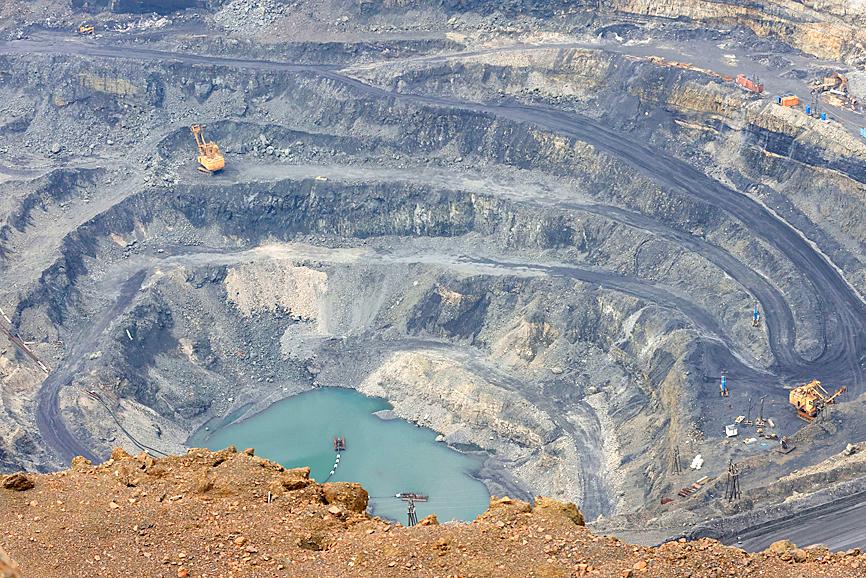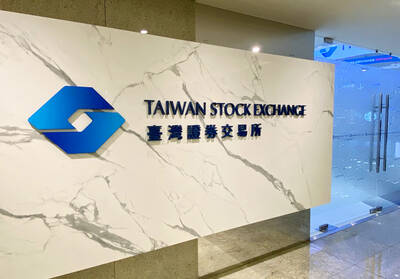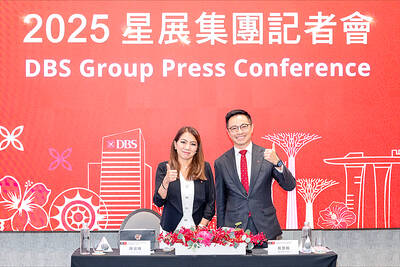The London Metal Exchange (LME) halted trading in its nickel market after an unprecedented price spike left brokers struggling to pay margin calls against deeply unprofitable short positions.
Nickel, used in stainless steel and batteries for electric vehicles, surged as much as 111 percent yesterday to trade briefly above US$100,000 a tonne.
The move — the largest-ever on the LME — came as investors and industrial users who had sold the metal scrambled to buy the contracts back after prices initially rallied on concerns about supplies from Russia, while brokers rushed to collect margin payments to cover their deeply unprofitable positions.

Photo: Reuters
The material had closed up 66 percent the day before.
It pared gains to be up 74 percent at US$83,500 a tonne as of 3:10pm in Shanghai.
The market on the LME is in the grip of a massive squeeze in which holders of substantial short positions are being forced to cover at a time of low liquidity.
To give a sense of nickel’s dizzying surge, it had risen about US$11,000 a tonne over the past five years.
This week alone, it has jumped by as much as US$72,000.
“It’s going crazy,” said Jiang Hang, head of trading at Yonggang Resources Co (永鋼資源).
“It’s not reflecting any industry fundamentals,” Jiang said.
The “LME trading system is out of control and requires intervention,” or the contagion might spill over to other metals, he said.
Late on Monday, the LME allowed traders to defer delivery obligations on all its main contracts — including nickel — in an unusual shift for a 145-year-old institution that touts itself as the “market of last resort” for metals.
The LME also gave a unit of China Construction Bank Corp (中國建設銀行) extra time to pay hundreds of millions of dollars in margin calls that were due on Monday, people familiar with the matter said.
Nickel was already rallying on tight supplies even before Russia invaded Ukraine, which has sharpened fears of sweeping commodity shortages.
Higher nickel prices, if sustained, threaten to ratchet up costs for electric vehicle batteries.
Russia produces 17 percent of the world’s top-grade nickel.
“What we do know is that markets tend to overreact a little bit, they sometimes over-shoot, but in this instance, with the uncertainty of war, it’s hard to talk about a commodity being over-valued,” said Gavin Wendt, an analyst at consultancy Mine Life Pty in Sydney.

Taiwan Semiconductor Manufacturing Co (TSMC, 台積電) secured a record 70.2 percent share of the global foundry business in the second quarter, up from 67.6 percent the previous quarter, and continued widening its lead over second-placed Samsung Electronics Co, TrendForce Corp (集邦科技) said on Monday. TSMC posted US$30.24 billion in sales in the April-to-June period, up 18.5 percent from the previous quarter, driven by major smartphone customers entering their ramp-up cycle and robust demand for artificial intelligence chips, laptops and PCs, which boosted wafer shipments and average selling prices, TrendForce said in a report. Samsung’s sales also grew in the second quarter, up

LIMITED IMPACT: Investor confidence was likely sustained by its relatively small exposure to the Chinese market, as only less advanced chips are made in Nanjing Taiwan Semiconductor Manufacturing Co (TSMC, 台積電) saw its stock price close steady yesterday in a sign that the loss of the validated end user (VEU) status for its Nanjing, China, fab should have a mild impact on the world’s biggest contract chipmaker financially and technologically. Media reports about the waiver loss sent TSMC down 1.29 percent during the early trading session yesterday, but the stock soon regained strength and ended at NT$1,160, unchanged from Tuesday. Investors’ confidence in TSMC was likely built on its relatively small exposure to the Chinese market, as Chinese customers contributed about 9 percent to TSMC’s revenue last

Taiwan and Japan will kick off a series of cross border listings of exchange-traded funds (ETFs) this month, a milestone for the internationalization of the local ETF market, the Taiwan Stock Exchange (TWSE) said Wednesday. In a statement, the TWSE said the cross border ETF listings between Taiwan and Japan are expected to boost the local capital market’s visibility internationally and serve as a key for Taiwan becoming an asset management hub in the region. An ETF, a pooled investment security that is traded like an individual stock, can be tracked from the price of a single stock to a large and

Despite global geopolitical uncertainties and macroeconomic volatility, DBS Bank Taiwan (星展台灣) yesterday reported that its first-half revenue rose 10 percent year-on-year to a record NT$16.5 billion (US$537.8 million), while net profit surged 65 percent to an unprecedented NT$4.4 billion. The nation’s largest foreign bank made the announcement on the second anniversary of its integration with Citibank Taiwan Ltd’s (花旗台灣) consumer banking business. “Taiwan is a key market for DBS. Over the years, we have consistently demonstrated our commitment to deepening our presence in Taiwan, not only via continued investment to support franchise growth, but also through a series of bolt-on acquisitions,” DBS